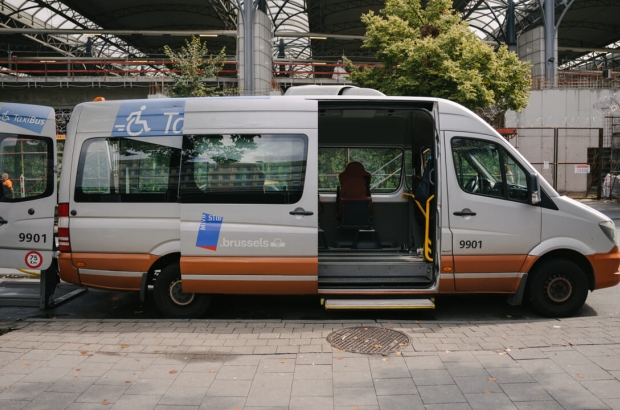- Daily & Weekly newsletters
- Buy & download The Bulletin
- Comment on our articles
Stib scales back taxis for disabled due to budget concerns
Brussels public transport operator Stib is scaling back its offer of affordable taxis for the disabled due to budget concerns.
Stibs offers €1.90 taxi or minibus rides for people with reduced mobility but is now adding a cap of 60 rides per user per month, Bruzz reports. The number of trips per day will also be limited.
About 3,000 people with reduced mobility used the service last year, accounting for approximately 207,000 door-to-door journeys.
“Every year, we see an increase in demand for the Taxibus, but the subsidy we receive doesn’t change,” said Stib spokesperson Laurent Vermeersch, explaining that Stib received €4.7 million last year but the final cost was €1.7 million higher.
“If we were to continue at this rate, the loss would amount to €2.5 million.”
The Collectif Accesibilité Wallonie-Bruxelles expressed concern about the cap, criticising the "rapid and radical change" and estimating that about 23,000 journeys will no longer be able to be booked.
“This decision will restrict the freedom of movement of a group of people who are already severely disadvantaged in terms of mobility,” director Mathieu Angelo told RTBF.
“The service will no longer allow them to travel on an equal footing with other Stib customers. Staying at home cannot be an option in an inclusive society.”
Stib said an evaluation of the situation could take place at the end of summer, but the agency is limited by the ongoing lack of a government in Brussels. Other solutions - for example, raising the ticket cost - cannot be pursued without a functioning regional government.
“It’s regrettable that Stib had to take this decision,” said outgoing mobility minister Elke Van den Brandt (Groen), calling on the politicians involved in the delayed formation of the government to "stop their vetoes and egos".
“It proves once again that the most vulnerable are the first victims of the Brussels deadlock.”
The special taxi service was first created because Stib’s infrastructure was not sufficiently adapted to people with reduced mobility, but Vermeersch said “a lot of effort has been made in recent years”, including more lifts and more platforms adapted for better access.
“Of course, there’s still work to be done, but we do invite users to see if they can reach their destination using the regular lines,” said Vermeersch.
“This will leave more space on the Taxibus for people who are unable to do so.”
One daily user of the taxi service, Anne Delvaux, said the new cap would severely limit her ability to get around with her wheelchair.
“Sixty trips means one return trip per day, maximum – what are we supposed to do, choose between going to work or going to the physiotherapist?” she told RTBF.
“And forget about going out. If we want to go out in the evening, we'll have to make a choice, because we'll have already used up our quota of trips. I have physiotherapy every day, for example. I won't be able to use Taxibus for anything else during the day.”
Not every Stib station has been adapted for accessibility needs, including the one closest to where Delvaux lives.
“To get to the other side of town, I have to take a bus, then a tram or the metro, and each time there's the risk that a lift will be out of order. And when that happens, you're stuck,” she said.
“During morning rush hour, there's no room for us. The same goes for late afternoon. The Taxibus service simply means we don't get exhausted. For me, it's an essential service for my quality of life.”



















